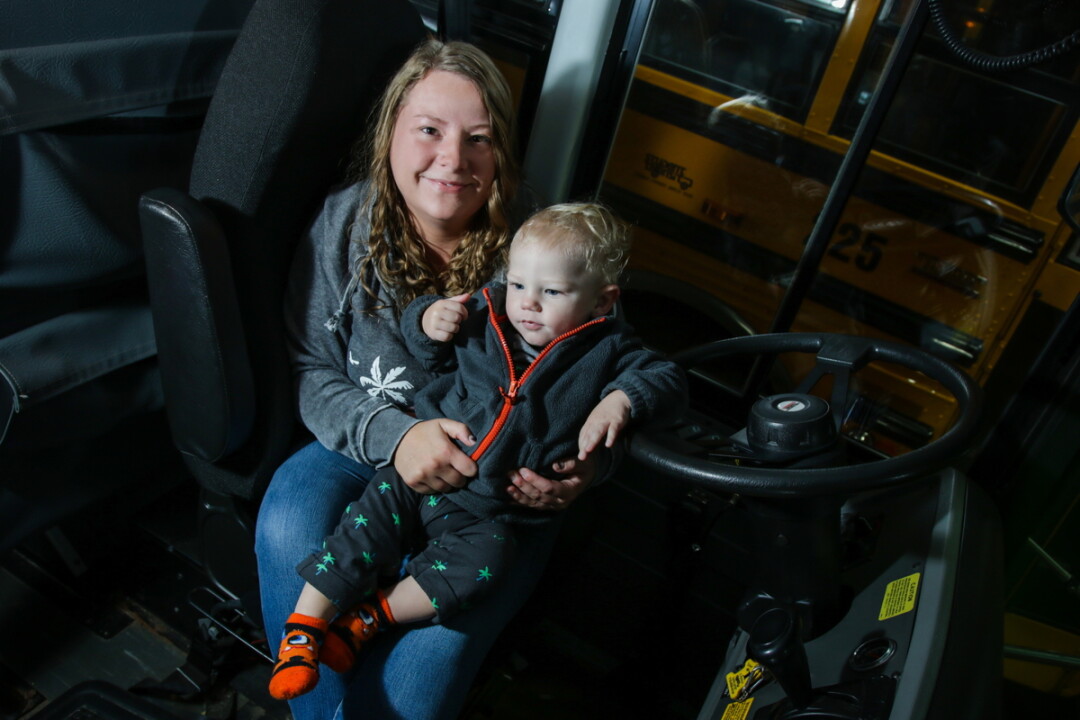Co-Working With Kids in the Chippewa Valley
Lauren Fisher, photos by Andrea Paulseth

In the modern workforce, most people who parent infants or young children and work outside the home must effectively split their wage with a caretaker. That might be a daycare center, a nanny, babysitter, or an in-home daycare provider. The average annual cost of such services in Wisconsin is more than $12,000, according to the Economic Policy Institute. That works out to nearly one-fifth of the state’s median household income, or more than half of the income of a family of three living at the federal poverty level.
Here in the Chippewa Valley, a few businesses help ease this financial – and emotional – burden by allowing parents to bring their infants and young children into the workplace. It’s a trend that’s popping up in workplaces across the United States, harkening back to work structures that have existed since the beginning of mankind.
“We just recognize how important it is to have that connection with your infant, and we want to make that as easy as possible.” – Naomi Cummings, The Bridge to Hope
The Bridge to Hope, a Menomonie emergency shelter and crisis hotline, has had a “bring your baby to work” policy in place since 2011. New parents are permitted to bring their infants to the office until they’re 180 days old, at which point they begin crawling and become harder to manage in such a setting. This practice helps parents save money on childcare and allows them to make the most of the bonding opportunities in early infancy.
“We just recognize how important it is to have that connection with your infant, and we want to make that as easy as possible,” Naomi Cummings, the program’s executive director, said.
In order to make workplace caretaking run smoothly, staff members volunteer to help parents watch their child during the occasional situation where they must be away. According to Cummings, this system also forges a stronger bond among employees, who know they can always count on one another.
“We serve families here, so to me it seems like a good fit,” Cummings said. “We’re kind of role models, too, parenting role models.” It helps the people who use The Bridge to Hope’s services to see that all parents face challenges in bringing up their children, she said.
Another area employer, Eau Claire Student Transit, has had a children-in-the-workplace policy as long as human resources director Jennifer Peterson can remember. During the 20 years she has worked there, drivers and office workers have been permitted to bring their infants, toddlers, and even school-aged children into the workplace, provided they follow safety protocols. Some workplaces might find that some employees aren’t pleased with such arrangements, but neither Peterson or Cummigs have found any issues.
“It’s going to depend on the kind of company you have,” Peterson said. “For us it works, and it works well.”
While not all workplaces are suited for the presence of young people – Peterson and Cummings both cringe to imagine an infant in a factory – offices can be ideal candidates for these programs. The Parenting in the Workplace Institute has a number of suggestions for creating a functional policy and making easy accommodations for changing and breastfeeding.
“A bus is kind of like an office on wheels,” Peterson said with a chuckle. “We call it an office with a view.”
Peterson has taken advantage of the policy herself; She often brought her son to work with her when he wasn’t feeling well or during days when school was out. Now, her daughter Tessa, a bus driver with Student Transit, takes her own child to work with her. Policies like these allow parents to make a living without giving up part of their paychecks to daycare, and gives people peace of mind knowing that their baby is OK at all times, Peterson said.
“We look for things that will make people happy, make them want to come to work, make them love their job,” Peterson said. And this, she thinks, is one of those things.
Some kids “grow up” on the bus, Peterson added. One Student Transit employee’s grandmother and aunt both took him with them to work on occasion – now he’s a driver with the company.
“When you have an infant, part of your heart is always with that infant,” Naomi Cummings, The Bridge to Hope’s executive director, said. “When the baby’s right there next to you, I think it gives you a peace of mind.”
More information about children and infant workplace policies, including resources, can be found on babiesatwork.org.


